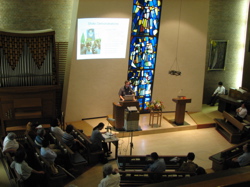Center for Interdisciplinary Study of Monotheistic Religions(CISMOR)Doshisha University
> Public Lectures > Sadr Movement in Iraqi PoliticsPublic Lectures
Lecture (Open for the public)
Sadr Movement in Iraqi Politics
| Date: |
2007/07/17 17:00-19:00 |
|---|---|
| Place: | Chapel in the Divinity Hall, Imadegawa Campus, Doshisha Univ. |
| Lecture: | Prof. Juan Cole (University of Michigan) |
| Summary: | |
|
Although about sixty percent of people in Iraq are Shiite Muslim, they have strayed from political power in the modern Iraqi state. In Iraq the Sunna monarch was settled by Britain at the beginning of the 20th century, and then the Ba’ath party of Sunna came into power. The Ba’ath party declared secularism and Arab nationalism in the 1950s, and extended its influence throughout Iraq. The Communist party likewise expanded its reach during this period. From this history, the U.S. at the beginning of Iraqi war regarded Shiites as secular, but this was a mistake. In 1958 a Shiite clergyman, Muhammad Baqir al-Sadr, had already established the Da’wa party setting out the establishment of an Islamic state under Islamic law, against the Ba’ath party. However, Saddam Hussein, taking precautions against the Iranian Islamic Revolution in 1979, prohibited the activity of the Da’wa party in order that the revolution did not influence it, and then a number of Shiite leaders including Muhammad Baqir al-Sadr were executed. In the Gulf War, two distinguished Shiite leaders emerged after the oppression of Shiites by Saddam Hussein: Ayat Allah Ali Sistani, a conservative, and Muhammad Muhammad Sadiq al-Sadr. At the time this Sadiq al-Sadr, a relative of Muhammad Baqir al-Sadr, established a militia organization composed of the poor in East Baghdad. This group gained support through activities for social welfare and showed their objection to Hussein in a public way. As a consequence Sadiq al-Sadr was assassinated, but was succeeded by his son, Muqtada al-Sadr. At first the U.S. had not received information about Muqtada al-Sadr, nor about the militia organization of Shiites, but afterwards it quickly took measures against Sadr’s troops. The U.S. wants on the one hand to block their increase in power, but on the other hand to avoid antagonizing the public, including the poor. So the U.S. is now trying to isolate Sadr’s militia, the Mahdi Army, and weaken it indirectly by calling on the Maliki administration not to have contact with it. To conclude, what was the cause, after all, of the current mess of Iraqi problems? The first cause was insufficient recognition about the Iraqi domestic situation by the U.S. and the initial attempt to call back from exile some Iraqi persons of influence and to utilize them for governing the country. But in Iraq, Sadr’s militia composed of the poor Shiites of southern Iraq had grown. Sadr’s side also shares in the blame; the army of the poor is not sufficiently disciplined as an organization. And their leader, Muqtada al-Sadr himself, is still young and is not conversant with politics because of his long hermitage during the time of the Hussein regime. In addition, his political stance aims at reconciliation with Sunnis by setting up an Iraqi nation, but on the other hand he strongly belongs to the Shiites as a sectarian group. Although Sadr’s followers have gotten some political power through the coalition with the Maliki administration, the political situation all in all depends on the relationship between Prime Minister Maliki and the U.S.-which remains unclear. Kenichiro Takao (COE Promoted Reseacher, Graduate Student, School of Theology, Doshisha University) |
|
|
Handout |
|

